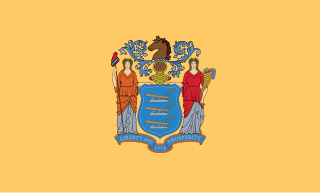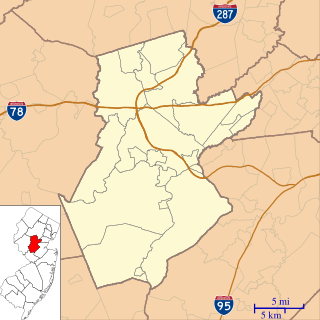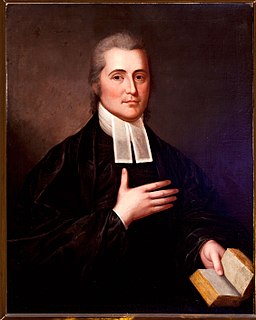Matthew Leydt (1755–1783) was the first graduate of Queen's College (now Rutgers University) in New Brunswick, New Jersey.

Rutgers, The State University of New Jersey, commonly referred to as Rutgers University, Rutgers, or RU, is a public research university in New Jersey. It is the largest institution of higher education in New Jersey.

New Brunswick is a city in Middlesex County, New Jersey, United States, in the New York City metropolitan area. The city is the county seat of Middlesex County, and the home of Rutgers University. New Brunswick is on the Northeast Corridor rail line, 27 miles (43 km) southwest of Manhattan, on the southern bank of the Raritan River. As of 2016, New Brunswick had a Census-estimated population of 56,910, representing a 3.1% increase from the 55,181 people enumerated at the 2010 United States Census, which in turn had reflected an increase of 6,608 (+13.6%) from the 48,573 counted in the 2000 Census. Due to the concentration of medical facilities in the area, including Robert Wood Johnson University Hospital and Saint Peter's University Hospital, as well as Rutgers, The State University of New Jersey's Robert Wood Johnson Medical School, New Brunswick is known as both the Hub City and the Healthcare City. The corporate headquarters and production facilities of several global pharmaceutical companies are situated in the city, including Johnson & Johnson and Bristol-Myers Squibb.

New Jersey is a state in the Mid-Atlantic and Northeastern regions of the United States. It is located on a peninsula, bordered on the north and east by the state of New York, particularly along the extent of the length of New York City on its western edge; on the east, southeast, and south by the Atlantic Ocean; on the west by the Delaware River and Pennsylvania; and on the southwest by the Delaware Bay and Delaware. New Jersey is the fourth-smallest state by area but the 11th-most populous, with 9 million residents as of 2017, and the most densely populated of the 50 U.S. states; its biggest city is Newark. New Jersey lies completely within the combined statistical areas of New York City and Philadelphia. New Jersey was the second-wealthiest U.S. state by median household income as of 2017.
Matthew was the son of Syntje Slegt (1729–1763) (also spelled Tryntje Slecht or Sleight) and the Rev. Johannes Leydt (1718–1783), minister of the Dutch Reformed congregation at New Brunswick and at Six Mile Run in Franklin Township (both from 1748 until his death), and Trustee of Queen's College [1] Matriculating as a sophomore when instruction began in 1771, he graduated at the age of 19 with a Bachelor of Arts (A.B.) degree in 1774 —constituting the college's entire first graduating class. While at Queen's, Leydt studied under Frederick Frelinghuysen, the college's first tutor [2] and was instructed in theology by the Rev. Jacob Rutsen Hardenbergh, who became the college's first president in 1786.
The Dutch Reformed Church was the largest Christian denomination in the Netherlands from the onset of the Protestant Reformation until 1930. It was the foremost Protestant denomination, and—since 1892—one of the two major Reformed denominations along with the Reformed Churches in the Netherlands.

Six Mile Run is an unincorporated community and census-designated place (CDP) located in Franklin Township, in Somerset County, New Jersey, United States. As of the 2010 United States Census, the CDP's population was 3,184.

Franklin Township is a township in Somerset County, New Jersey, United States. As of the 2010 United States Census, the township's population was 62,300, reflecting an increase of 11,397 (+22.4%) from the 50,903 counted in the 2000 Census, which had in turn increased by 8,123 (+19.0%) from the 42,780 counted in the 1990 Census.
After graduation, Leydt was licensed to enter the ministry of the Dutch Reformed Church in 1778. He served at the Southampton Dutch Reformed Church in Neshaminy in Bucks County, Pennsylvania, until his death on November 24, 1783 in North Hampton, Pennsylvania, at the age of twenty-eight.

Bucks County is a county located in the Commonwealth of Pennsylvania. As of the 2010 census, the population was 625,249, making it the fourth-most populous county in Pennsylvania and the 99th-most populous county in the United States. The county seat is Doylestown. The county is named after the English county of Buckinghamshire or more precisely, its shortname.

Pennsylvania, officially the Commonwealth of Pennsylvania, is a state located in the northeastern, Great Lakes and Mid-Atlantic regions of the United States. The Appalachian Mountains run through its middle. The Commonwealth is bordered by Delaware to the southeast, Maryland to the south, West Virginia to the southwest, Ohio to the west, Lake Erie and the Canadian province of Ontario to the northwest, New York to the north, and New Jersey to the east.













